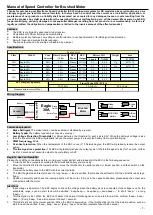
Manual
of
Speed Controller for
Brushed Motor
- 1 -
Size
Li-poly
NiMH
NiCd
L*W*H
20A
Eagle-20A
20A
25A
Linear
5V/1A
2-3
4-10
17g
45*21*8
30A
Eagle-30A
30A
40A
Linear
5V/1A
2-3
4-10
21g
45*21*8
Eagle-40A
40A
50A
Linear
5V/1A
2-4
4-12
Eagle-40A-E
40A
50A
Linear
5V/2A
2-4
4-12
Eagle-50
50A
60A
Linear
5V/1A
2-4
4-12
Eagle-50-E
50A
60A
Linear
5V/2A
2-4
4-12
Eagle Series
Weight
Battery Cell
50A
40A
BEC
Mode
BEC
Output
Class
Model
Cont.
Current
Burst Current
(>10s)
Red
Black
Battery
-
+
Brushed
Motor
B
A
T
T
E
R
Y
Eagle
30A
Brake
On/Off
Battery Type
Brake
Off
Brake
On
NiCd/NiMh
Battery
Lithium
Battery
Receiver
+
-
Battery
Thanks for purchasing our
Electronic Speed Controller (ESC). High power system for RC model can be very dangerous, so we
strongly suggest you read this manual carefully. In that we have no control over the correct use, installation, application, or
maintenance of our products, no liability shall be assumed nor accepted for any damages, losses or costs resulting from the
use of the product. Any claims arising from the operating, failure or malfunctioning etc. will be denied. We assume no liability
for personal injury, property damage or consequential damages resulting from our product or our workmanship. As far as is
legally permitted, the obligation to compensation is limited to the invoice amount of the affected product.
Features:
The ESC is controlled by advanced microprocessor.
Compatible with lithium battery and nickel battery.
Multiple protection features: Low-voltage cut-off protection / over-heat protection / throttle signal loss protection.
Smooth, linear and precise throttle response.
The brake function can be enabled or disabled by a jumper.
Specifications:
Wiring Diagram:
Features Explanation:
1.
Brake Settings
:
The brake function can be enabled or disabled by a jumper.
2.
Battery Type
:
The battery type can be chosen by a jumper.
3.
Low Voltage Protection Threshold
:
For lithium batteries, the threshold for each cell is 3.0V. When the battery
’s voltage is less
then the threshold, the ESC will gradually reduce the output power to prevent the battery from over discharging.
4.
PWM Frequency
:
2KHz.
5.
Over-heat protection:
When the temperature of the ESC is over 110 Celsius degree, the ESC will gradually reduce the output
power.
6.
Throttle signal loss protection:
The ESC will gradually reduce the output power if the throttle signal is lost for 1 second, further
loss for 2 seconds will cause its output to be completely cut-off.
Begin To Use Your New ESC:
Please check all the connections before running your model aircraft, and please start the ESC in the following sequence:
1.
Correctly set the 2 jumpers according to the aircraft and battery you are using.
2.
Move the throttle stick to the lowest position, move the throttle trim to neutral position or lowest position, and then switch on the
transmitter.
3.
Connect the battery pack to the ESC with the correct polarity.
4.
The ESC begins the self-test process, if a long
“beep----” tone is emitted, that means the self-test is OK, the aircraft is ready to go
flying.
5.
Speed up smoothly and check the running direction of the motor, if it runs in the opposite direction, please swap the output wire
connections with the motor.
Alert Tone
1.
Input voltage is abnormal: The ESC begins to check the voltage when the battery pack is connected, if the voltage is not in the
acceptable range, such an alert
tone will be emitted: “beep-beep----, beep-beep----,beep-beep----” (A short “beep-” + a long
“beep---” )
2.
Throttle signal is lost: When the ESC can
’t detect the normal throttle signal, such an alert tone will be emitted: “beep--, beep--,
beep--
”. (Every “beep--” has a time interval of about 1 second).
3.
Throttle stick is not at the lowest position: When the ESC is powered up, if the throttle stick is not at the lowest position, such an
alert
tone will be emitted: “beep-, beep-, beep-”. (Every “beep-” has a time interval of about 0.25 second).
2
4S Li-Poly
BEC Output Capability
Standard micro servos(Max.)
5
4
2S Li-Poly
3S Li-Poly
Linear Mode BEC(5V/2A)


